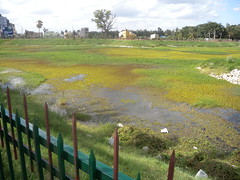/regions/south-deccan-plateau
South Deccan Plateau
Stellar, yet inadequate
Posted on 08 Dec, 2013 10:11 PMManipal University has a well-thought out, multi-pronged approach towards reducing its environmental footprint. This includes a comprehensive waste management policy and a programme to reduce energy consumption.

Crop cultivation or construction - tough choice in Andhra Pradesh
Posted on 17 Jun, 2013 05:29 PMThe construction industry went through a boom in the 1990s due to more people demanding and affording houses. This put a lot of pressure on the Pennar area in Andhra Pradesh. Sandmining, which is the process of taking sand, became rampant at that time.

Video: "80% of waste we generate everyday can be recycled": Interview with Vani Murthy, a Bangalore-based citizen activist
Posted on 06 Feb, 2013 01:19 PMSource of video: Chai with Lakshmi
Video: Practising high-density micro-organic farming on your roof top - An interview with Mallesh, Purna Organics, Bangalore
Posted on 05 Feb, 2013 04:46 PMSource of Video: Chai with Lakshmi
Microfinance institutions get away with farmer suicide abetment charges: Police close a third of the cases in Andhra Pradesh
Posted on 27 Apr, 2012 12:43 PMArticle Courtesy : Down to Earth
Author : M Suchitra
Precious Kaveri water down the drain; wasted to wash vehicles: Letter to the Chairman, Bangalore Water Supply and Sewerage Board
Posted on 23 Apr, 2012 12:47 PMDear Chairman BWSSB,
Maps, lakes and citizens: The use of surveys in lake conservation - An article in the Seminar magazine
Posted on 19 Mar, 2012 11:44 AMThis lake system is now decaying with lakes either taken over for urban uses, or choking due to neglect. ATREE and the Bruhat Bengaluru Mahanagara Palike (BBMP) have been engaged in attempting to understand how to restore these lakes for urban use, while maintaining their ecological importance. This article in Seminar describes this attempt.

Bore well recharging through "V" wire technology in Belavadi village, Chikmagalur district in Karnataka
Posted on 12 Mar, 2012 07:02 PMVideo Courtesy : FLRWHS
Utilisation of human urine as a source of nutrients for banana and maize cultivation - A compilation of research papers
Posted on 01 Mar, 2012 02:24 PMSource separated anthropogenic liquid waste (Human urine) - A potential plant nutrient for banana cultivation
Mayadantha Male (The miracle of rain) - All India Radio Karnataka programme on rainwater harvesting
Posted on 26 Feb, 2012 04:37 PM"The miracle of rain : Let the earth overflow"